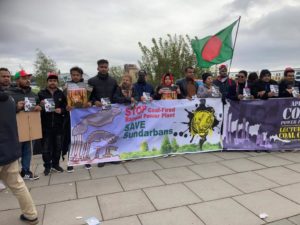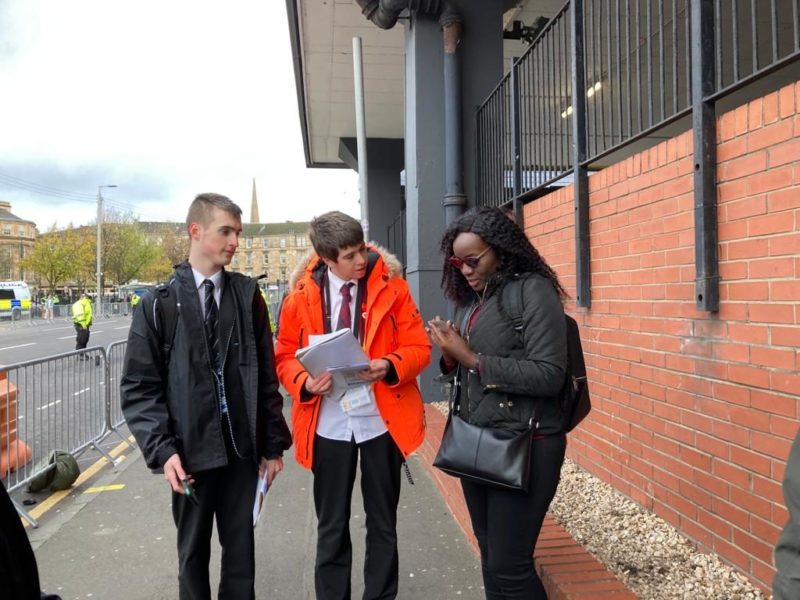What Do People Around The World Think About Climate Change?
The CEN carried out interviews with people from different countries to understand their motives for protesting as well as their views on current climate action. We took accounts from activists and the public who had experienced the varied consequences of climate change around the world:
Zambia
A supporter we spoke to from Zambia was very concerned about how poorer countries will pay for the damage caused by climate change and the improvements needed to help the environment. They told us about how they had “experienced a lot of droughts which has greatly impacted many people who cannot access any water“.
A lot of the countries coming to COP26 have enough wealth to aid struggling nations and so this supporter wants richer governments to help places like Zambia. This idea will be discussed during COP26 and hopefully plans to aid struggling nations will be created.
Bangladesh
When we spoke to a protester who came all the way from Bangladesh, they told us about how fossil fuels like coal are still being used and their government plans to continue to burn them. This is harmful to the environment as burning coal releases greenhouse gas that warms up our planet causing climate change.
They were obviously very worried about this as they told us that “it will be humankind’s greatest mistake if we do not act now”. There has been an increase in coal-fired electricity by 32% in Bangladesh and they plan on building 29 more coal-fired power plants. Worse still, they are making room for these by clearing areas like the Sundarbans.
The Sundarbans is a forest in Bangladesh that is home to mangrove trees. Unfortunately, many of these trees are being cut down which is a huge problem as the Sundarbans act as a natural shield to minimize the effect of heavy storms and cyclones. This is very important as without the mangroves, communities in Bangladesh would suffer. Also, plants and animals will lose their habitats/homes.

Columbia
Although this person was not a part of the protests, they were very passionate about the issues Columbia are facing because of climate change. The main thing this person wanted to see at COP26 was “bolder action to reduce emissions“, something that would slow down global warming and help the environment.
Reducing global emissions is something governments are working on now and some are even trying to reach net zero. This means that they will produce no harmful gases that contribute to climate change.
As we can see, globally we are all affected differently by climate change but we must work together to support one another. Fortunately COP26 and protesters can raise climate change awareness and create the platform needed to bring hope to nations all over the world!
Written by: Michael Thomson, Erin Stewart, Kate Kinloch-Anderson & Lachlan Donaldson
———————————————————————————————————————————-
Transcriptions of Interviews
INTERVIEW WITH ZAMBIAN PROTESTER
QUESTION “Has your life been altered by climate change?”
“Yes, I come from Zambia in Africa which has been hit heavily by climate change. In the past we’ve experienced a lot of droughts which has greatly impacted many people who cannot access any water.”
QUESTION “If you were one of the delegates talking at COP26 what solutions would you advocate for?”
“For me firstly, it is about access to finance because I think different countries come from different groupings. Many countries at COP26 have enough funds [to reduce climate change] but we also have countries who are struggling. For me I think this is one of the top issues is how countries will actually access these climate funds. Another aspect is adaptation, with COP26 and the Paris Agreement which is all about reducing Greenhouse Gas Emissions. I think adaptation and mitigation should be 50/50 to successfully make process.”
QUESTION “Has your community done anything to reduce climate change at a local level?”
“I come from an aversion called Caritas in Zambia which is an organisation under the Catholic Church, and we have been working with local communities, so we have been empowering them with knowledge to really understand what climate change is about and what they need to do at their level, but we have also been empowering them with skills so they are able to respond at the local level so more people are getting into initiatives that will allow them to adapt [their lifestyles].”
INTERVIEW WITH BANGLADESHI PROTESTER
QUESTION “Why are you protesting?”
“We are here because of the illegal action our government and [prime minister] Sheikh Hasina is taking and specifically because of climate change, this is one of the issues our government. A coal power plant has been established next to the world’s largest mangrove forest. Demolishing this forest will have a great impact on climate change. Our Prime Minister is seated in COP26 yet is allowing this to happen to my country. Climate change is our biggest concern that will face the future generation, it will be humankind’s greatest mistake if we do not act now.”
QUESTION “If you were a world leader what would your next steps be?”
“If I was the world leader, I would make sure I had moral values, I would understand people’s pain and try to help them. I will look at the facts to improve society.”
INTERVIEW WITH COLOMBIAN SUPPORTER
QUESTION: “Have you personally been affected by climate change?”
“Coming from Columbia which is a developing country in Latin America climate change has affected us greatly: rising temperatures, people being displaced out of their homes due to climate change and water scarcity these are the main issues my country faces.”
QUESTION: “If you were a leader at COP26 what would your solution be to this crisis?”
“If I was a part of the negotiations, I would definitely fight for bolder action to reduce emissions, no more postponing goals that countries and governments have made before. Moving on from negotiation to action I think that’s the most important thing.”
Sources
Bangladesh- https://apwld.org/letter-to-unesco-protect-sundarbans-from-coal-fired-power-plants/


